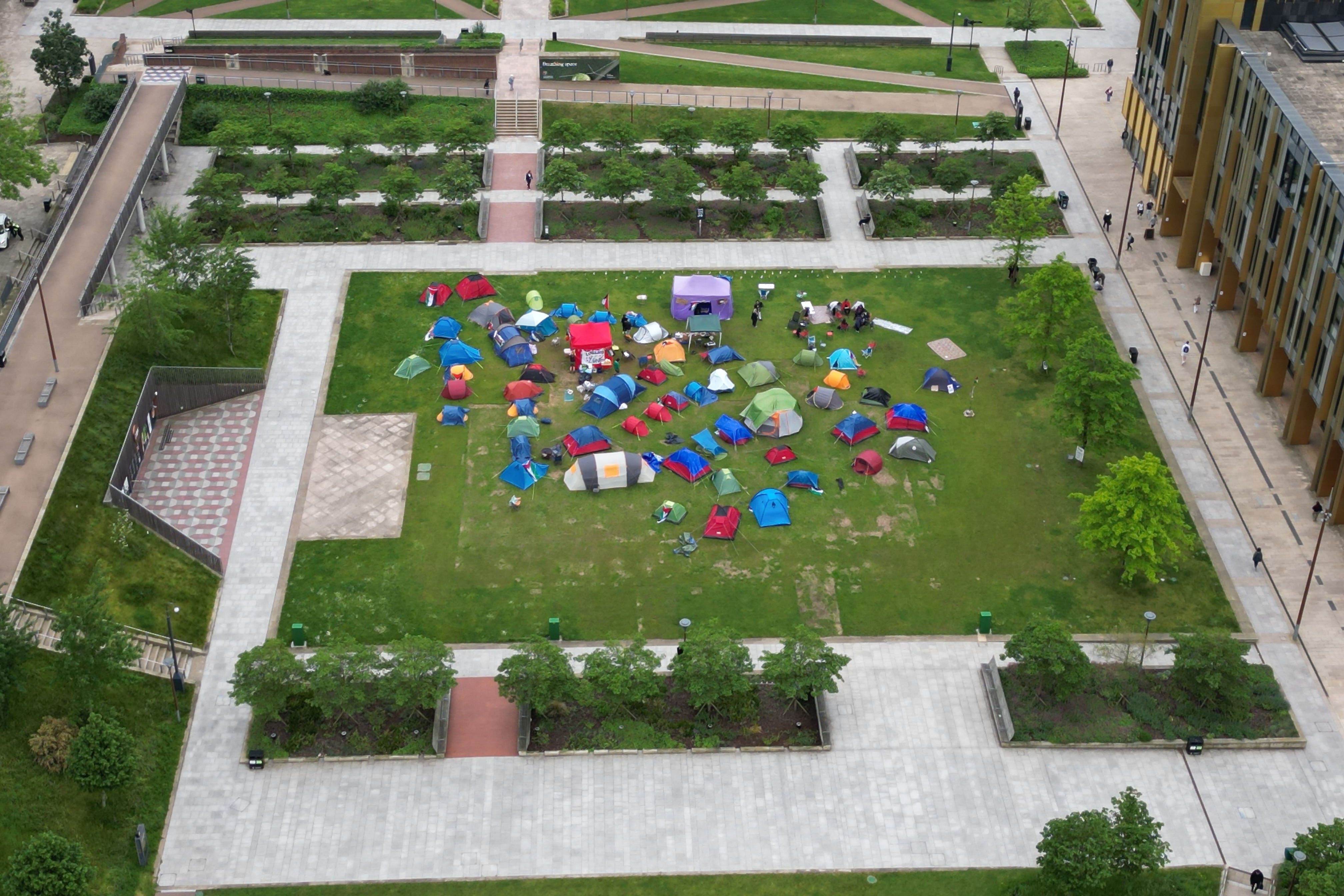Birmingham University seeks court order against Pro-Palestine protest encampment
Protesters are occupying a green space on the university’s Edgbaston campus.

The University of Birmingham is bringing a High Court challenge against a Pro-Palestinian protest encampment in a bid to end the occupation of a campus green space.
Lawyers for the educational body are asking a judge to issue a possession order over the “Green Heart” outdoor area on its Edgbaston campus that has been the site of the demonstration since early May.
The university claims protesters are trespassing on private land and have created “a substantial risk of public disturbance and serious harm to persons and property” as well as “significant financial loss and disruption to the University’s activities”, the court was told.
It complains that other students were being denied a “well liked and used outdoor space”, claiming it has impacted open days and plans for 28 graduation celebrations and other events.
A Muslim British-Pakistani undergraduate student defending against the bid to oust the encampment says students have taken action over the university’s alleged “complicity” in “a genocide” in conflict-hit Gaza through its links to arms firms.
Mariyah Ali, 20, from Walsall, claims she faces discrimination over the “manifestation” of her religious and philosophical beliefs, a judge was told.
Lawyers representing Ms Ali argue the protest is peaceful, has legitimate aims, with potential disruption being “modest” as tuition has ended for the summer.
At a hearing on Thursday, a judge heard the university secured a possession order last month over a campus area called “Chancellor’s Court” with an encampment there since dismantled.
University bosses now want a similar order against Ms Ali and “persons unknown” over the Green Heart occupation, as well as orders covering its Exchange Building in central Birmingham and its Selly Oak campus where there are currently no such protests.
It comes after The London School of Economics was granted a court order indefinitely barring encampments in one of its buildings after students slept in its atrium for more than a month in support of Palestine.
The university remains concerned that the situation will continue to deteriorate if the encampment is not now brought to an end
Dr Nicola Cardenas Blanco, the University of Birmingham’s director of legal services, said in a June 21 written witness statement that it had “a long track record of authorising events on campus, in recognition of the importance of the rights of freedom of speech and assembly”.
She said it sought to end the protests “in a diplomatic and peaceful way” and that the decision to take legal action was “not taken lightly”.
“It was not in any way motivated by the fact that the encampment was connected with Pro-Palestinian beliefs,” she added.
Dr Blanco said the protesters at Chancellor’s Court had re-located to the Green Heart encampment, with there being some 83 tents or gazebos on the green space on June 20.
The direct costs to the university of the occupation were just under £22,000, the court was told, with the relocation costs of affected graduation celebrations being £195,000.
Dr Blanco said “exclusionary behaviour and property damage” had led to the re-possession of Chancellor’s Court, adding of Green Heart: “The university remains concerned that the situation will continue to deteriorate if the encampment is not now brought to an end.”
In her written witness statement Ms Ali said the university had “demonstrable links” to companies, such as defence firm BAE Systems, who are allegedly “involved in the death and destruction in Gaza”, with it being her “moral duty” to express her views.
She claimed: “We think, the university want the land back to prevent us from visibly expressing, and confronting their consciousness and their reputation with, their investment and partnership complicity in what is a genocide. They want to repress the manifestation of our belief.”
In written arguments the university’s legal team denied alleged complicity.
Katharine Holland KC, for the university, wrote that the occupation aimed “to force the claimant to surrender to its demands”, adding that freedom of expression “does not take priority” over its property rights.
Liz Davies KC, representing Ms Ali, said in written submissions that the university had “not actively negotiated with the occupiers, rather it has focused on eviction”, adding that it had “disregarded their free speech rights”.
She claimed Vice-Chancellor Adam Tickell had refused to meet protesters while the encampment continues.
The barrister said the university previously made it a precondition for students to attend without masks and had “refused to give them guarantees against disciplinary sanction to enable meetings to occur”.
But she told the hearing meetings with university staff and masked protesters had taken place, adding that the encampment should be tolerated while these continue.
The university’s lawyers said in court documents it had previously been unable to identify other protesters.
Ms Davies said in written arguments it was “proportionate” for the Green Heart protest to continue, adding that there had been no complaints of violence or threats and a lack of evidence of disruption to staff and students.
The hearing before Mr Justice Johnson is due to conclude on Thursday, with a ruling expected at a later date.
Bookmark popover
Removed from bookmarks